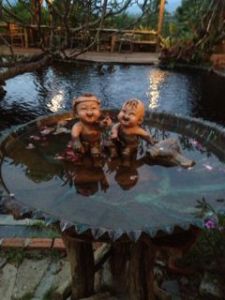 |
| babes in bird bath |
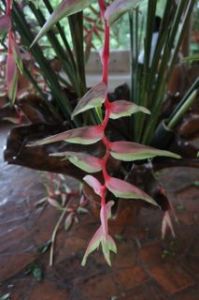 |
| Helaconia |
If I could choose two highlights of this five week exploration of Southeast Asia, it would be 1) elephant riding 4 times and 2) the Opium Museum, a project of the Royal Family of Thailand, put together by the King’s Mother prior to her death, set not in a city center but far away in the north near the Golden Triangle (Thailand, Laos, Myanmar come together at the merging of two huge rivers). This lavish garden estate of land and the reasonably contemporary museum housed there are worth the trip. Photography is not allowed and so far there are no catalogues in English, sadly. It is an emotional experience and at the end, visitors are employed to seek solutions to drug addiction all over the world. The King’s mother’s inheritance for her nation was the Doi Tung Development Project to help curb and end the opium trade and give farmers a substitute crop to produce, such as tea, rubber, rice, coffee and peaches, now produced beautifully by the Hill tribes in Northern Thailand, where the opium trade was severe for decades and is still smuggled in from neighboring countries. There are road checks often.
Opium poppies were the controversial crop exploited by the British in the 1800s so they could buy tea and silk from Siam and Burma and China and bolster their vital trade. Trade was the backbone of their colonialism which no one has been able to repeat since. The effects on people and countries were not concerns of those who set up such illicit trades. Just keeping the coffers filled with the pleasures and needs of the trader. Once the trade falters, many people suffer, left with addictions and poverty.
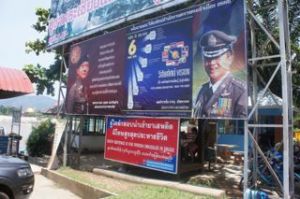 |
| Serious Business |
In China as early as the 8th century opium was brought onto the scene by Muslim traders to satisfy medicinal needs. In the 16th century, both in China and Europe (the Dutch and Portuguese sailors), opium sap was boiled and sold as healing drugs. With the introduction of tobacco from the New World, (and also missionaries and empire builders and pirates who thrived in this trade) a more potent way of ingesting opium was introduced (i.e. smoking not as cigarettes but a ball of the paste put on a pin, heated over a lamp, and inhaled through a pipe) and enter the recreational part. There is a whole ambiance in opium dens which includes artifacts of use, such as lamps, pipes, bowls, weights, and other paraphernalia. Opium smoking was the Hermes/Cartier of the day – a sign of wealth and high social stature. The dens we have been exposed to appeared dingy and depressing and full of unwilling addicts, and there was plenty of that, but there rose another environmental level with elegance and excess for the rich and educated. Even opium smoking dress was ornate and Manchurian emperors indulged.
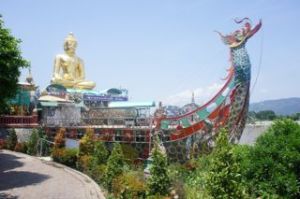 |
| Buddha floats |
In the 1800s the British (who still use paper poppies in honoring their fallen soldiers on Memorial Day in November) commercialized opium, licensing opium farms, giving seeds to farmers, and even built speedy clipper ships to get the product to home ports. The British East India Company refused to be paid in gold and silver for their trading but wanted opium. The Chinese tired of paying in products (silk and tea = the British have to have their tea) and not wanting to empty their coffers of gold and silver, desired to be paid in gold and silver or put an end to the opium trade and to limit production of opium to medicinal. But, smuggling grew because it was so profitable. Emperor after emperor took up the cause to eliminate unchecked opium trade. So did the British want free trade with no taxes or inspections. Finally the British moved their opium fields to India where today it is grown legally (for medicinal use), as it is in Egypt, Australia,Tasmania and Turkey. The Opium Wars and became just a skirmish for the great British empire, but humiliated China in its defeat. This part of the history is artistically displayed in dioramas and videos. Even Mao Tse Tung attempted to eliminate all poppy fields from his country and today, if a person is caught with one single Papaver somniferum in their possession in Thailand, they go to prison for a while. This is one reason there was no poppy “farm” for me to visit, although it had been written in the schedule as a “do.”
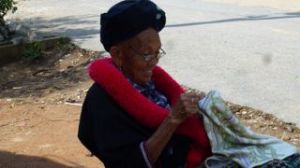 |
| Lao Hill Tribe Grandmother |
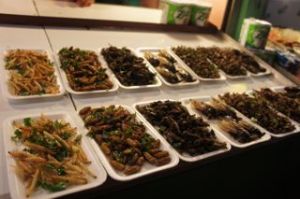 |
| Slugs and bugs not drugs |
The museum was just incredible. Everything you want to know – or didn’t want to kno – about the history of the opium trade and addiction. Entrance is a long long walk through a tunnel with walls in bar-relief of the agonies of addition, very abstractly done. Then there is a film about the history and trade before walking through dioramas and displays of the finest sort. It takes a long time because here you really do stop and watch the videos and learn truths you may not want to know – such as how Americans funded the cover war in Laos (outside of Vietnam) because they needed funds for the war, so supported the opium trade. As I have always believed, this was the point when our GIs became addicted to the whole drug world – not just opium by-products but as well the now drug encroaching in too many lives in Southeast Asia – methamphetamine. It is a horrific problem among youth. Statistics say American opium addicts in 1931 were about 120-140,000 then it fell to less than .2 percent by 1938. American and Egyptian heroin addicts at this time were less than five per cent of the Chinese ones. That was then. China accounted for 90 per cent of the opium addicts. Today, the use of opium products has soared. And most of it comes from Afghanistan, where a huge percentage of that population lives in addiction. Films and documentation support the truth.
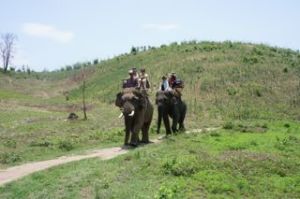 |
| On the road again |
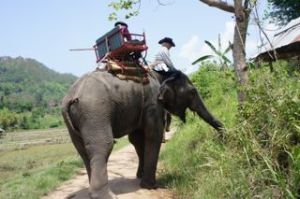 |
| Snack attack |
Hard to realize is that during the Vietnam war, our military aircraft flew guns to the rebels in return for opium as payment for weapons, a CIA operative. And these very planes also transported opium without inspection to our nation. As I look at the young kids who come through Foster Care today – though decades later – I am disgusted that those years and those drugs and the illegal trade of them have destroyed generations of our youth to come. Heroin, I have been told, is making a comeback in the States.
For the good news, there is peace and sway in elephant riding. My teenage (15 years old) elephant was named Pet and she was one hungry critter. She was pacing while chained waiting for a rider, and by golly, once I got on and we got on the trail, I saw why. As you know elephants must eat 24-7 and the ones in this elephant camp are healthy looking. They have been rescued from the logging industry and roaming the streets. The fields and roadsides are green with tall grasses of the sweetest sort and Pet probably ate half of them in the hour trip. She’d stop, grab and grab and grab a whole bouquet of grasses or reach up for her favorite leaves on a tree and somehow seemed to smile. It was fascinating to see the trees she by-passed – they had sort of shiny leaves like a rubber tree nor did she like bamboo.
 |
| More? |
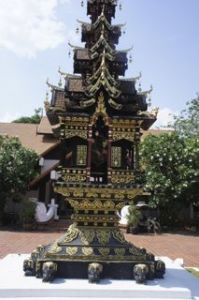 |
| Ode to elephant |
When the mahout allowed me to crawl down on her neck (I usually stay barefooted when I am privileged to ride because it is a holy thing for me) into his place and he took over mine in the uncomfortable box on top, I was in tears of joy. Staying balanced was important (it’s a long way to the ground) and bending the knees upward like a jockey so my feet rest in the crux of the back of her ears. Immediately Pet lifted her trunk up to touch me, wondering who the heck this was, and seemed to not be disturbed as she returned to grabbing food along the row. The sun was terribly hot – like 100 degrees mid-day. I felt my jeans were on fire. A local cowboy hat did shield my face from the rays and made me think of days of yore on horseback in the west. At the end, after a quick dip in the river, and Pet showed her ability to spray water, she was rewarded with a big bunch of bananas. I loved this elephant because she always seemed to be smiling. I certainly was, too.
This five week adventure is coming to an end. I’m back in Bangkok to wrap up a few things and dine tonight (Friday) at a popular restaurant called Condoms and Cabbage, started by a man who was trying to get birth control going among the sex traders and prostitutes of this town. Apparently he has baskets of condoms at the door. There you go Novella. A creative approach to a tough issue.
Tomorrow begins 22 hours in the air until I should be safe in Memphis, praying all the way for another Grizzlies victory. There won’t be any physical temples at which to leave offerings but there is more important the heavenly temple of our blessed Lord. That’s all I need. Thanks be to God.

Audrey,
Your amazing adventure is coming to an end. You have had a fantastic five weeks with exciting experiences that most people cannot even imagine.
Riding Pet the elephant for over an hour was the perfect way for you bring everything to a close. Loved the photos, “On The Road Again” and “Snack Attack.”
Would love to see a picture of you riding Pet barefooted wearing your cowboy hat–that would be one for the ages and one that would tell a story about you, the adventurer, the world traveler!
Your history of the opium trade was really interesting. We’ve learned so much from all of your blogs. Thank you for sharing your adventures!
We made that long flight home from Bangkok in 1985. We flew from Bangkok to Dallas on Thai Airlines and that was the nicest flying experience we ever had.
Hope you have a smooth flight. We’ll be so glad when you are safely home. God bless you.
Lots of love,
Geraldean and Judge
Audrey,
By the way, we believe that must be you on Pet in the photo “Snack Attack.” We are assuming that it is you, because the individual is wearing a cowboy hat. Hope you have a better photo from the front, so you can be easily identified. That would be one to frame and put on your wall.
Did you receive our e-mail about your birthday dinner on Friday, June 21st? It will be a fun evening!
We love you,
Geraldean and Judge